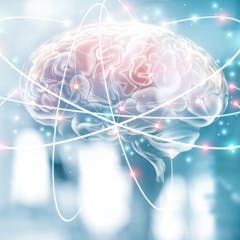
Articles on Brain
Displaying 21 - 40 of 596 articles

Vegetarian and low-carb diets aren’t ideal for our brains.

Is brain transplant surgery the stuff of dark Hollywood fairytales or a feasible possibility?

Around 4% of the population are unable to see things in their mind’s eye. Except when they are dreaming.

Middle age could be a period when we can detect early risk factors of future cognitive decline.

A man from Florida was found to have tapeworm cysts in his brain.

Sleep appears to play an essential role in a number of brain functions, such as memory. So good quality sleep could play a vital role in preventing dementia.

Two new high-profile studies add to the increasingly worrisome picture of how even mild cases of COVID-19 can have detrimental effects on brain health.

The people manning the guns are also at risk of injury from the force of the weapon.

We envisage a future in which sleep is a routine target for reducing or preventing symptoms of mental illness, both in psychiatric settings and people’s homes

Brain-computer interface devices have the potential to boost users’ autonomy, especially for people who experience paralysis. But that comes with risks, as well.

As Elon Musk’s Neuralink begins inserting chips into human brains, we trace the history of ‘mind reading’ technology and assess the potential risks and rewards

Neuralink’s first human trial is more than just a technical milestone; it represents a major leap in potential human-computer interaction.

Scientists have published the first evidence that Alzheimer’s can be transmitted from person to person. Patients received human growth hormone from the tissue of donated brains.

Oral contraceptives modify the menstrual cycle. What’s less well known is that they also reach the brain, particularly the regions important for regulating emotions.

Lots of factors can influence your music taste, from your age and where you’re from to the personality traits you have.

Fibre isn’t just associated with colon health; it’s associated with overall health and brain health through the gut-brain axis. But not all fibres are created equal.

The preference for fairness emerges early in childhood, suggesting it is to some extent hardwired.

AI will not become sentient and decide to kill us all. But our own conscious or unconscious beliefs about AI can potentially increase the likelihood of any outcome, including catastrophic ones.

Doing two things at the same time isn’t always as productive, healthy or safe as focusing on one thing at a time.

Montréal is home to one of the world’s largest brain banks, the Douglas-Bell Canada Brain Bank, where discoveries about different neurological and psychiatric diseases are made.
